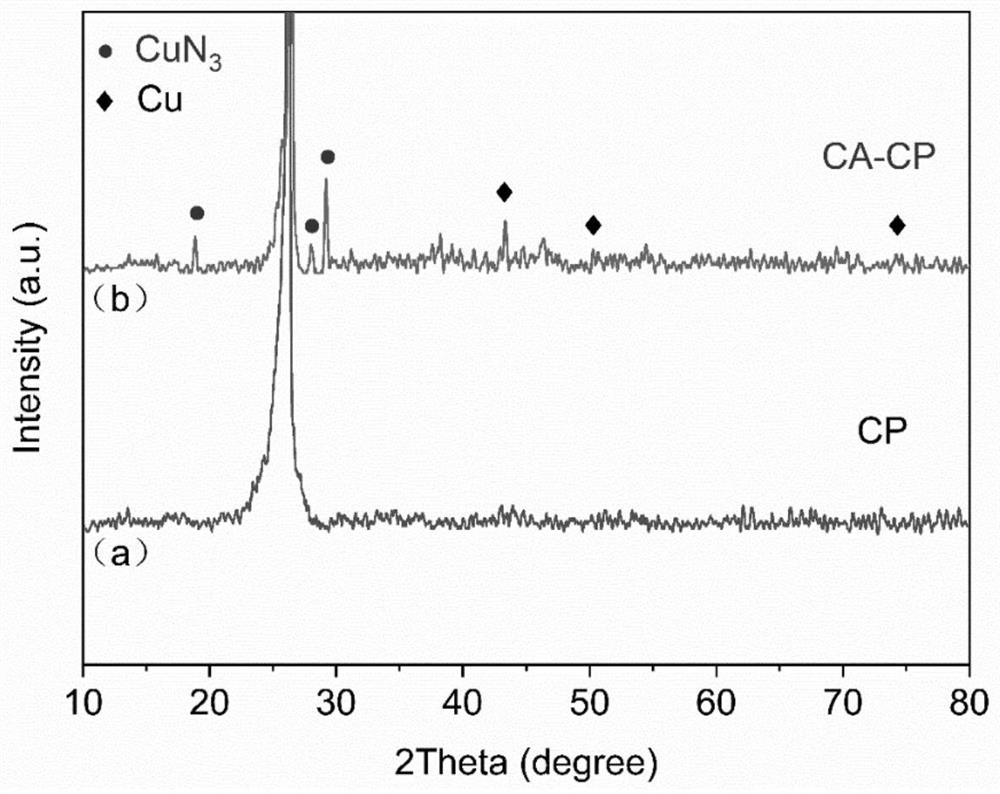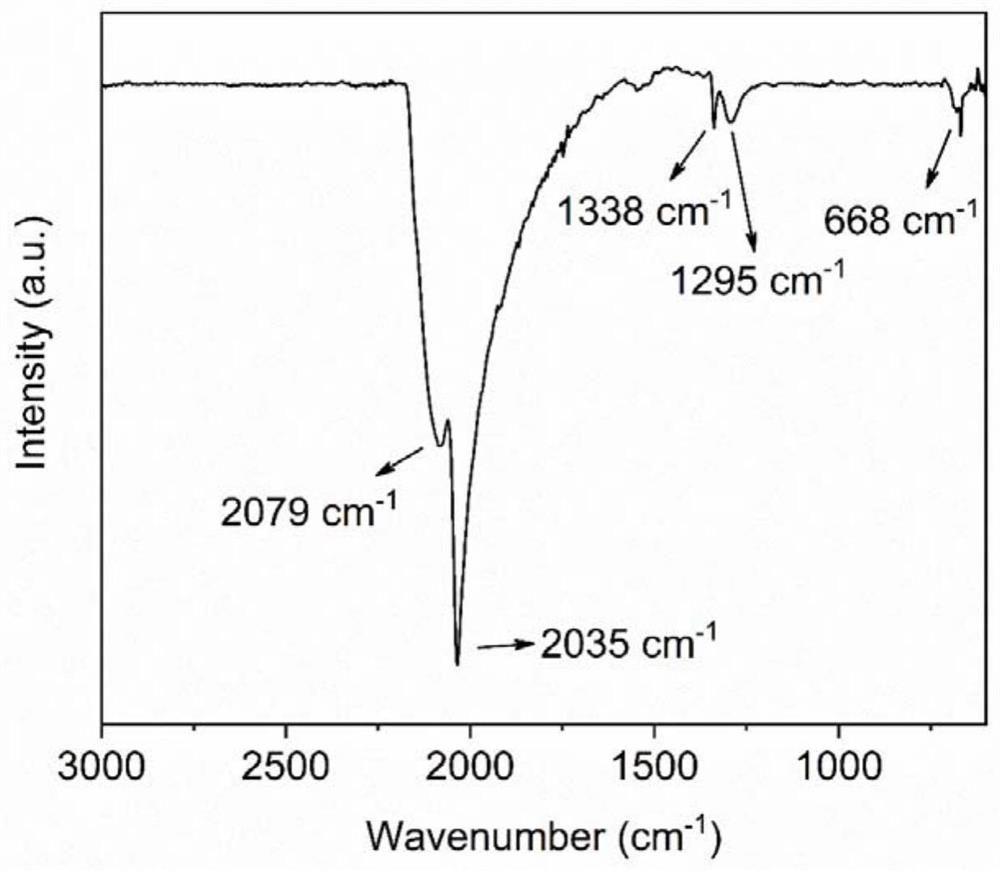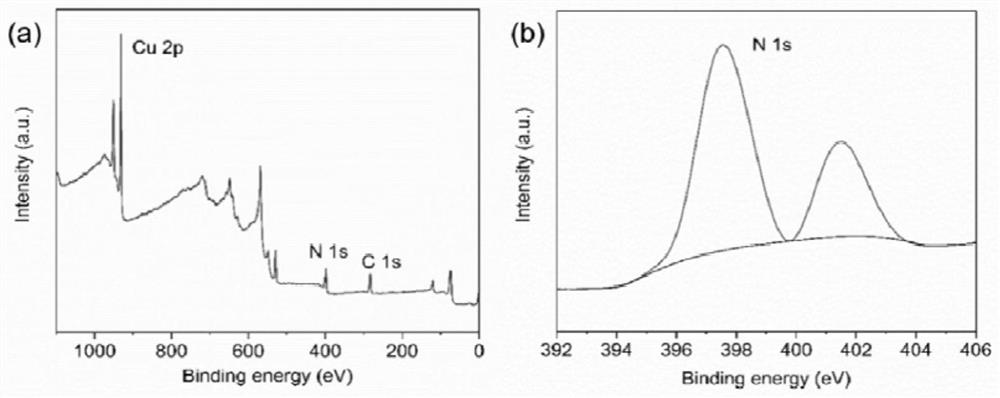Preparation method of energetic film ni-cr bridge wire pyrotechnic product with strong ignition ability
A kind of pyrotechnics, ni-cr technology, applied in the direction of offensive equipment, fuze, electrophoretic plating, etc., can solve the problems of in-situ synthesis operation trouble, small size of Ni-Cr bridge wire, etc., achieve convenient assembly and integration, improve resistance Electrostatic capacity, the effect of reducing the accumulation of static electricity
- Summary
- Abstract
- Description
- Claims
- Application Information
AI Technical Summary
Problems solved by technology
Method used
Image
Examples
Embodiment 1
[0030] The specific steps for the preparation of energetic film Ni-Cr bridge wire pyrotechnics are as follows:
[0031] Step 1: Use deionized water as a solvent, configure a 0.1M copper sulfate solution, add sodium chloride and sodium citrate dihydrate with a concentration of 5mM, carbon paper as the cathode electrode, and use two-step electrophoretic deposition on carbon fiber paper. The upper clad copper layer, the electrophoresis parameter is the first 3mA / cm 2 25min deposition time, 30mA / cm after 2 deposition for 5min;
[0032] In the second step, the Cu-C obtained in the first step is used as the anode, and the 0.02M sodium azide aqueous solution is used as the electrolyte, and the current density is 2 mA / cm. 2 The azide reaction was carried out for 30min, washed and dried to obtain a cuprous azide film;
[0033] Step 3, assemble and integrate the cut cuprous azide film and the Ni-Cr bridge wire initiating product, and fix it with a Ni-Cr bridge wire pressing cap.
Embodiment 2
[0035] The specific steps for the preparation of energetic film Ni-Cr bridge wire pyrotechnics are as follows:
[0036] Step 1: Use deionized water as a solvent, configure 0.2M copper sulfate solution, add sodium chloride and sodium citrate dihydrate with a concentration of 5mM, carbon paper as the cathode electrode, and use two-step electrophoretic deposition on carbon fiber paper. The top is covered with copper layer, and the electrophoresis parameter is first 1mA / cm 2 30min deposition time, 20mA / cm after 2 deposition for 10min;
[0037] In the second step, the Cu-C obtained in the first step is used as the anode, and the 0.01M sodium azide aqueous solution is used as the electrolyte, and the current density is 5 mA / cm. 2 The azide reaction was carried out for 10 min, washed and dried to obtain a cuprous azide film;
[0038] Step 3, assemble and integrate the cut cuprous azide film and the Ni-Cr bridge wire initiating product, and fix it with a Ni-Cr bridge wire pressing ...
Embodiment 3
[0040] The specific steps for the preparation of energetic film Ni-Cr bridge wire pyrotechnics are as follows:
[0041] Step 1: Use deionized water as a solvent, configure 0.05M copper sulfate solution, add sodium chloride and sodium citrate dihydrate with a concentration of 1mM, carbon paper as the cathode electrode, and use two-step electrophoretic deposition on carbon fiber paper. The top is covered with copper layer, and the electrophoresis parameter is the first 5mA / cm 2 15min deposition time, 40mA / cm after 2 deposition for 5min;
[0042] In the second step, the Cu-C obtained in the first step is used as the anode, and the 0.02M sodium azide aqueous solution is used as the electrolyte, and the current density is 3 mA / cm. 2 The azide reaction was carried out for 20min, washed and dried to obtain a cuprous azide film;
[0043] Step 3, assemble and integrate the cut cuprous azide film and the Ni-Cr bridge wire initiating product, and fix it with a Ni-Cr bridge wire pressi...
PUM
 Login to View More
Login to View More Abstract
Description
Claims
Application Information
 Login to View More
Login to View More - R&D
- Intellectual Property
- Life Sciences
- Materials
- Tech Scout
- Unparalleled Data Quality
- Higher Quality Content
- 60% Fewer Hallucinations
Browse by: Latest US Patents, China's latest patents, Technical Efficacy Thesaurus, Application Domain, Technology Topic, Popular Technical Reports.
© 2025 PatSnap. All rights reserved.Legal|Privacy policy|Modern Slavery Act Transparency Statement|Sitemap|About US| Contact US: help@patsnap.com



